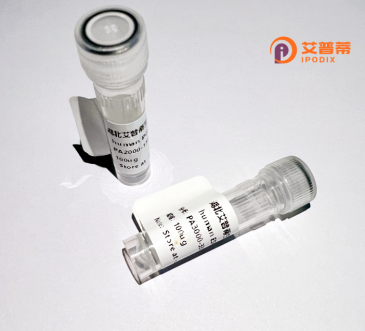
| 纯度 | >90%SDS-PAGE. |
| 种属 | Human |
| 靶点 | ARMS2 |
| Uniprot No | P0C7Q2 |
| 内毒素 | < 0.01EU/μg |
| 表达宿主 | E.coli |
| 表达区间 | 1-107aa |
| 氨基酸序列 | MLRLYPGPMV TEAEGKGGPE MASLSSSVVP VSFISTLRES VLDPGVGGEG ASDKQRSKLS LSHSMIPAAK IHTELCLPAF FSPAGTQRRF QQPQHHLTLS IIHTAAR |
| 分子量 | 11.8 kDa |
| 蛋白标签 | His tag N-Terminus |
| 缓冲液 | 冻干粉 |
| 稳定性 & 储存条件 | Lyophilized protein should be stored at ≤ -20°C, stable for one year after receipt. Reconstituted protein solution can be stored at 2-8°C for 2-7 days. Aliquots of reconstituted samples are stable at ≤ -20°C for 3 months. |
| 复溶 | Always centrifuge tubes before opening.Do not mix by vortex or pipetting. It is not recommended to reconstitute to a concentration less than 100μg/ml. Dissolve the lyophilized protein in distilled water. Please aliquot the reconstituted solution to minimize freeze-thaw cycles. |
以下是关于 **ARMS2(Age-Related Maculopathy Susceptibility 2)** 的3篇关键文献概述:
---
1. **文献名称**: *"A variant of mitochondrial protein LOC387715/ARMS2. not HTRA1. is strongly associated with age-related macular degeneration"*
**作者**: Kanda A, et al.
**摘要**: 本研究确定ARMS2基因(LOC387715)rs10490924变异是年龄相关性黄斑变性(AMD)的独立风险因素,与邻近的HTRA1基因无直接关联,提示ARMS2可能在AMD的发病机制中起重要作用。
---
2. **文献名称**: *"ARMS2/HTRA1 locus variants confer risk for geographic atrophy and its rapid progression"*
**作者**: Fritsche LG, et al.
**摘要**: 通过大规模全基因组关联分析,发现ARMS2/HTRA1基因座的特定单核苷酸多态性(SNPs)不仅与干性AMD(地图状萎缩)相关,还影响疾病的进展速度,可能与补体系统或氧化应激通路相关。
---
3. **文献名称**: *"The ARMS2 protein mediates mitochondrial dynamics and cell survival in the retina"*
**作者**: López de Arquero S, et al.
**摘要**: 首次揭示ARMS2蛋白在线粒体动态平衡和光感受器细胞存活中的功能,其缺失导致线粒体碎片化及细胞凋亡增加,提示ARMS2变异可能通过破坏视网膜能量代谢参与AMD发展。
---
这些文献涵盖了 **基因关联研究**、**临床表型关联** 及 **分子机制探索**,为进一步理解ARMS2在AMD中的作用提供了多维证据。
Age-related macular degeneration (AMD) is a leading cause of vision loss in older adults, and the **ARMS2** (Age-Related Maculopathy Susceptibility 2) gene has been identified as a major genetic risk factor. Located on chromosome 10q26. ARMS2 gained attention through genome-wide association studies linking specific variants, particularly rs10490924. to increased AMD susceptibility. Despite its strong association, the precise biological function of ARMS2 remains unclear due to challenges in detecting its protein product and conflicting studies on its localization.
Initially hypothesized as a mitochondrial protein, some research suggested ARMS2 localizes to mitochondria and may influence oxidative stress response, a key AMD pathway. However, other studies propose it interacts with **HTRA1**, another AMD-linked gene, in the extracellular matrix, affecting tissue remodeling. The **rs10490924** variant results in a protein-truncating mutation (A69S), potentially impairing protein stability or interactions, though mechanistic details are still debated. ARMS2 risk alleles are strongly associated with late-stage AMD, including geographic atrophy (dry AMD) and choroidal neovascularization (wet AMD).
Research continues to explore ARMS2’s role in AMD pathogenesis, with implications for developing targeted therapies, such as gene editing or antioxidant-based interventions. Its genetic interplay with HTRA1 and contribution to mitochondrial dysfunction underscore the complexity of AMD mechanisms, highlighting the need for further functional studies to resolve existing controversies.
×